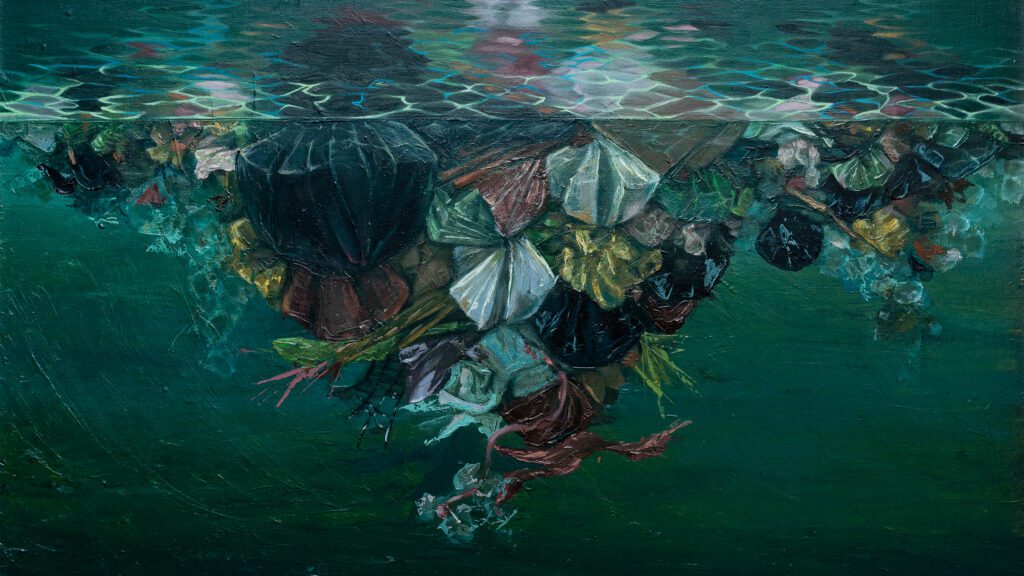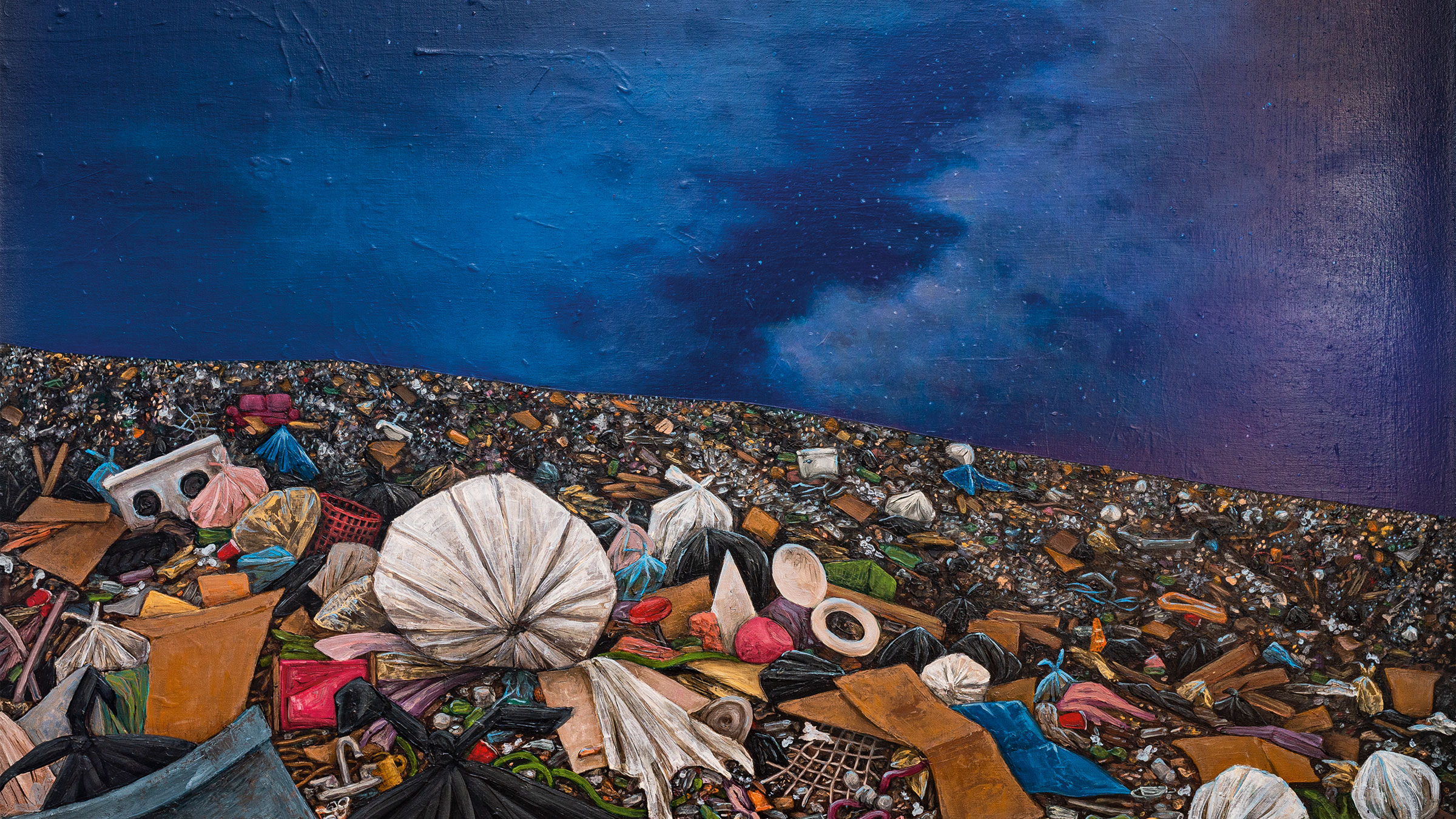I love a good Target run as much as the next person. Stepping through the automatic doors of the popular superstore, it’s impossible to not feel uplifted. The lighting recalls the beckoning freedom of summer, and the colors are like a new crayon box. It’s a palpable promise of a fresh start.
One sweltering day several years ago, hearing the swoosh of the doors and feeling the relief from the sudden blast of air conditioning, I found myself drawn to an assortment of overflowing bins. “Happy Bargains!” a sign called out. “$1!” confirmed another. With my bright red cart, I eagerly approached. I mean, who wouldn’t want to go digging through bins to find a magical item that could yield joy? And at such low cost!
“Understanding the immensity of what’s at stake, how do we overcome the habit energy that drives us to pursue a kind of happiness that causes climate change?”
I eventually picked something, but whether that item was a brightly colored notebook or a plastic cup with a sassy quip, I can’t recall what it was. However, I do remember that by the time I got home and unwrapped it on the kitchen counter, the promise of happiness had already faded. Like every other unnecessary item I’d ever purchased with the certainty that this was the thing that would finally solve the painful conundrum of being human, this thing was just more clutter.
My interest in decluttering began on a family retreat with Thich Nhat Hanh. During one of his dharma talks, the Zen monk momentarily caught my eye while encouraging families to create what he called a breathing room—a space in the home for the practice of peace and compassion. A working mom of four school-aged kids, I became determined to create a breathing room for my family. I knew this meant I would need to let go of all the outgrown clothes, unused toys, and unfinished craft projects overwhelming our home. Yet when I attempted to do this, I realized that these possessions (possessions I’d purchased with the desperate hope that they could provide relief from suffering) were now causing me to suffer. Guilt, regret, worry, and anxiety about waste rose up to consume me, draining me of any real hope for change. And there, in the midst of my clutter, I bore witness to an endless cycle: Consuming emotions lead to consumer habits. Consumer habits lead to consuming emotions.

In time, I became a professional declutterer, helping people realize that they—like me—had been caught in this cycle of consumption. I could hardly blame them for (literally) buying into the same delusion I had fallen for. The impulse to buy is remarkably human—and chasing after happiness even more so. Yet we’re not simply pursuing happiness; we’re running from our suffering toward some unfillable promise that, if we buy enough of the right things, we’ll find refuge. We know that illness, aging, and death are inextricable from our lives, and yet we still have the tendency to grab at every bauble as if it were a life preserver—an antidote to our impermanence. But our futile pursuit of a happiness that can be bought and sold is not just costing us in terms of overstuffed closets. I realized this when I transitioned unexpectedly from decluttering to the field of climate change.
When I started working in climate, I learned that for every “happy bargain” I purchase, a puff or two of carbon dioxide ascends to the atmosphere where it will remain for decades, trapping heat on the earth’s surface and warming the planet. Independently, the costs of my personal consumption are inconsequential. But multiply my habits by billions of consumers, and we begin to see the damage in millions of metric tons of daily carbon dioxide emissions.
We are pursuing individual happiness at the cost of our collective survival. We’re each attempting to outrun our suffering, and that suffering is gathering force in the atmosphere and circling back only to create more suffering. And though ultimately that suffering will touch every life on our planet, it will most gravely and unjustly impact those communities with the least economic resilience: those with the least economic capacity to run will suffer for the folly of those who have the economic resources to run the fastest. Our independent choices are no individual matter.
We are careening down a dangerous path carried along by the momentum of what Thich Nhat Hanh would call our “habit energy”—energy acquired from our society that moves us along expediently without conscious thought or regard for outcome. Understanding the immensity of what’s at stake, how do we overcome the habit energy that drives us to pursue a kind of happiness that causes climate change?
One answer comes from a few lines of a gatha—a simple verse that I learned along with my children on that family retreat with Thich Nhat Hanh so many years ago:
Breathing in, I see myself as a flower.
Breathing out, I feel fresh.
Breathing in, I see myself as a mountain.
Breathing out, I feel solid.
Breathing in, I see myself as space.
Breathing out, I feel free.
Here, in the midst of our steady, mindful breath, we’re reminded that the freshness and freedom we seek are not just characteristics of flowers and wide-open spaces; they’re also qualities inherent in us. We are reminded that, like mountains, we are solid and dignified; we have the sovereign capacity to be present to our suffering without being carried away by it or the urge to run from it.
So, the next time you’re standing in a superstore amidst overflowing bins wondering which bargain might offer respite from your discomfort, or your finger is hovering over the “Buy Now!” button on your phone screen, take some gentle breaths and repeat that gatha, reminding yourself that freshness and freedom aren’t commodities, but gifts you carry. Tell yourself that you are solid as a mountain, and recall that you need not be carried away by your emotions or driven to consume as a panacea for your pain. In doing this, you won’t independently solve the problem of climate change, but you’ll resist the cycle of consumption driving it.
An equitable transition to a low-carbon economy is essential to our collective survival. We should work toward that transition with the urgency it demands. We should keep taking to the streets and calling our legislators to demand just environmental and economic policies that center the safety of the most marginalized. And as we do so, we can and should do what the Buddha proposed over two thousand years ago: stop trying to outrun suffering. Only then will we realize that happiness was never out of reach. Happiness and suffering—inevitable partners in life—dwell in the same location: precisely in the place we sit.

